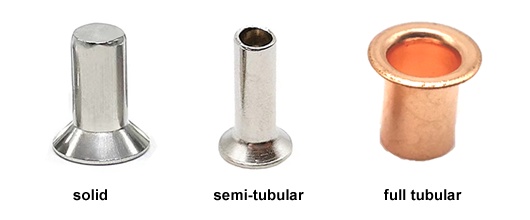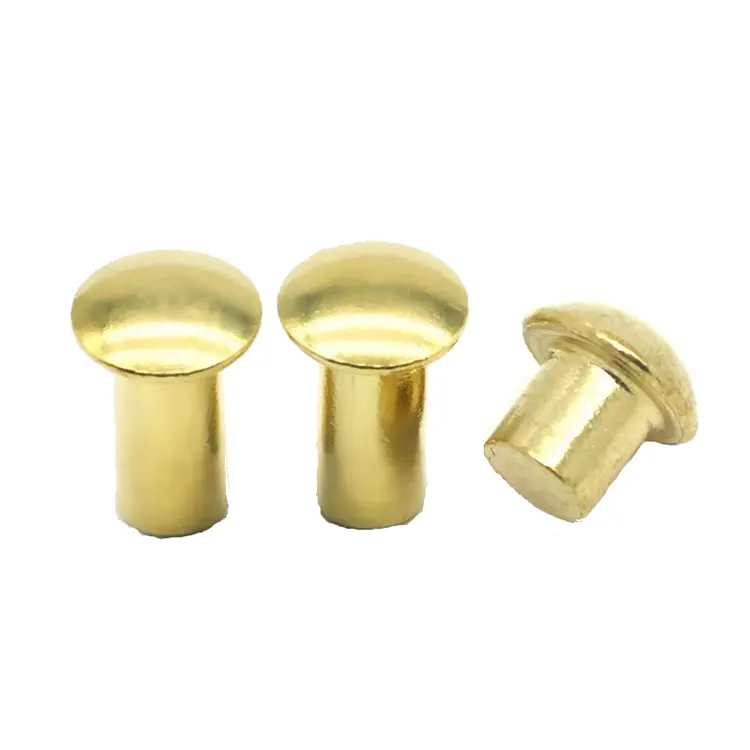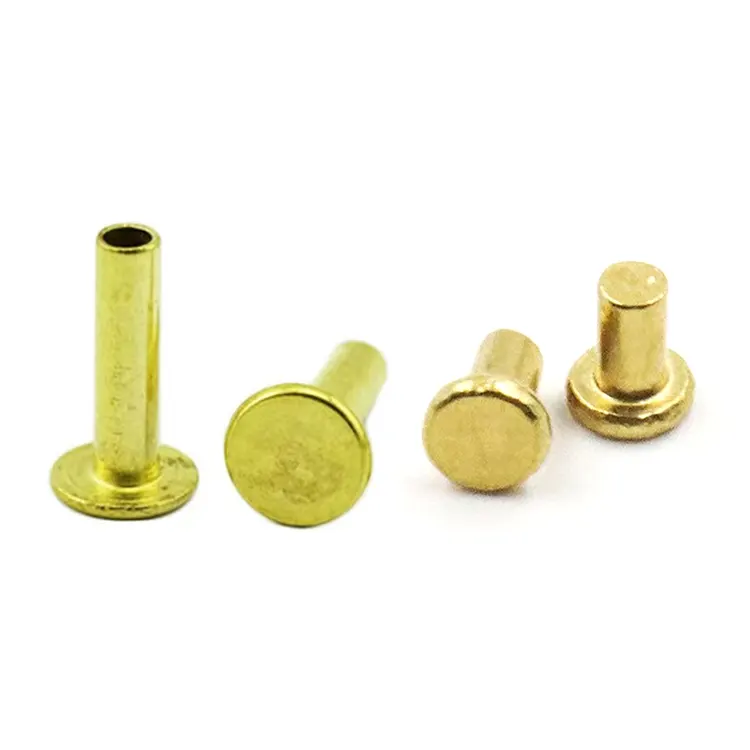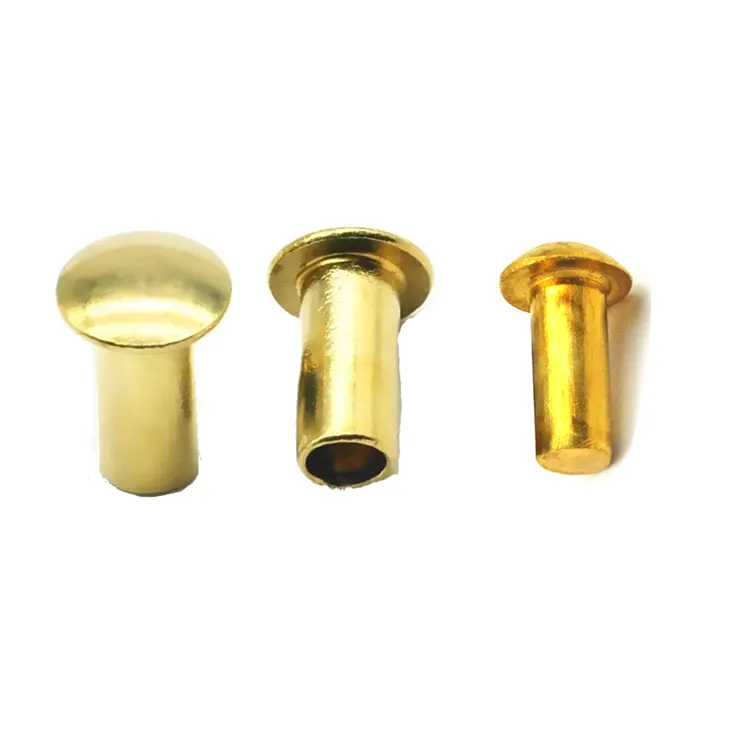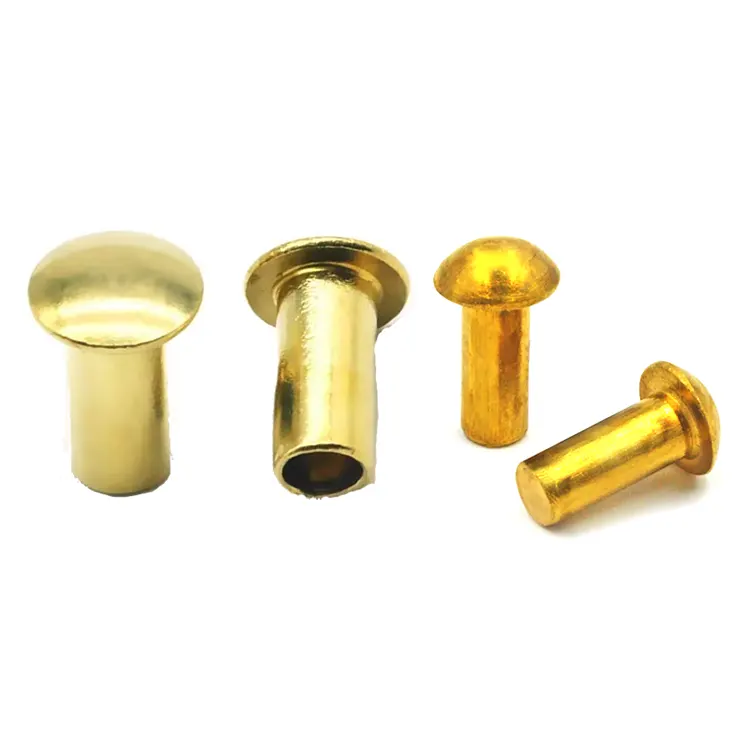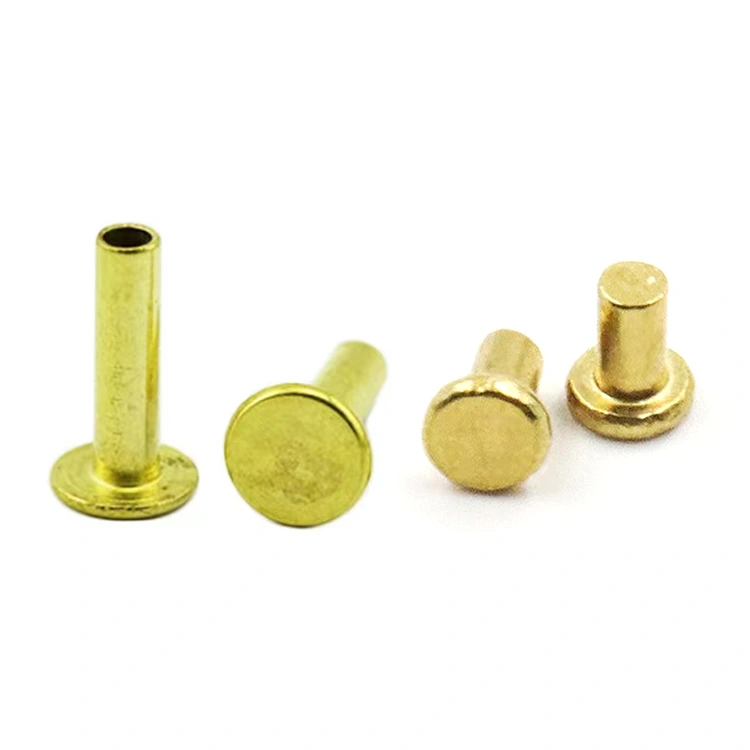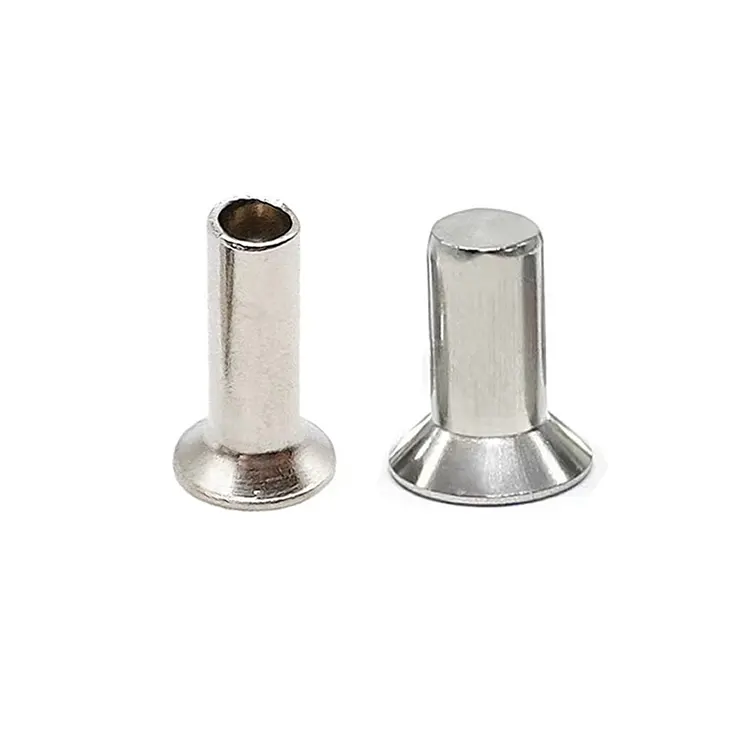Rivets
As one of professional manufacturer in China, Notin would like to provide you Rivets. And we will offer you the best after-sale service and timely delivery.
What is a rivet?
A rivet is a permanent mechanical fastener used to join two or more materials. Rivets work by inserting a metal pin into an aligned hole and deforming the end, creating a strong, secure, and durable connection. Unlike temporary fasteners like screws, rivets do not rely on threads, but instead form a permanent connection, making them ideal for applications requiring high strength, durability, and vibration resistance.
Classification of Rivets
Rivets are typically categorized by head shape, degree of hollowness, or material.
Based on head shape, rivets can be classified as flat head rivets, round head rivets, countersunk head rivets, mushroom head rivets, universal head rivets, truss head rivets, etc.

Based on degree of hollowness, rivets can be classified as solid rivets, semi-tubular rivets, or full tubular rivets.
Based on material, rivets can be classified as brass rivets, stainless steel rivets, steel rivets, aluminum rivets, copper rivets, etc.
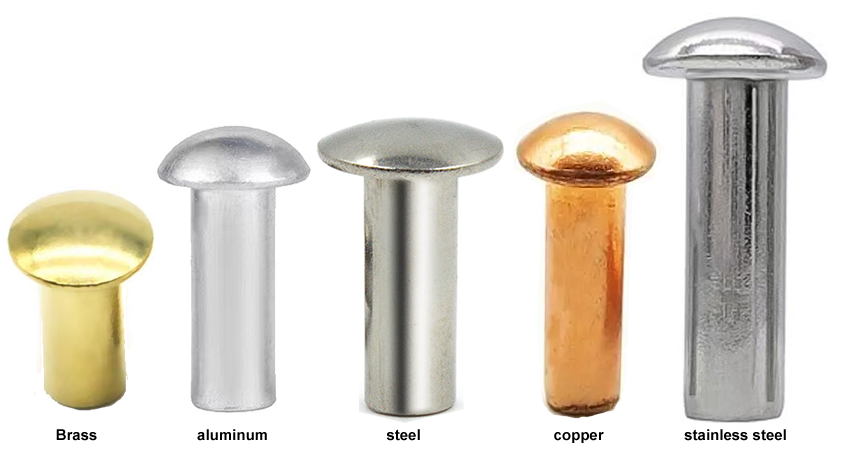
What surface finishes are available for rivets?
Rivet surfaces are typically treated with rust-proofing treatments, primarily electroplating, including zinc plating, nickel plating, chrome plating, tin plating, gold plating, and silver plating. Electroplating is a common rust-proofing method for rivets. It applies a layer of plating to the rivet surface through physical or chemical methods. The plating effectively prevents corrosion and rust, while also providing a certain aesthetic effect.
Another special surface treatment method is head coating. Head coating is performed after the rivet is electroplated. This allows for a variety of colors on the rivet head, achieving an aesthetically pleasing finish.
Aluminum rivets cannot be electroplated, but they can be anodized. Anodizing also allows for a variety of color options, but the unit price is higher than electroplating.
Rust-proofing the rivet surface is crucial, effectively extending the rivet's service life and ensuring a secure connection. Different rust-proofing methods are suitable for different environments and applications, so the choice should be tailored to the specific situation.
- View as
Rivets à tête ronde en laiton
Nuote Metals est spécialisé dans la production et la vente de rivets à tête ronde en laiton. Nous sommes situés à Dongguan, en Chine, une ville à fort développement industriel. Nos rivets à tête semi-bulgy en cuivre sont constitués d'une tige et d'un capuchon en alliage de laiton. La conception de la tête semi-bulgy assure une répartition uniforme de la pression, évitant ainsi d'endommager la surface du joint. Ils se caractérisent par leur conductivité électrique et leur résistance à la corrosion combinées, leur construction simple, leur installation facile, leur haute fiabilité et leur longue durée de vie.
En savoir plusenvoyer une demandeRivets en laiton
Nuote Metals produit des rivets en laiton en Chine. Les rivets en laiton sont principalement constitués d'un alliage de cuivre et de zinc, un matériau qui offre de nombreux avantages. L'excellente résistance à la corrosion du laiton lui permet de résister à une utilisation à long terme dans des environnements humides sans rouiller, ce qui le rend adapté à une utilisation en extérieur ou dans des conditions de forte humidité. Le laiton possède également une résistance et une dureté, lui permettant de résister aux contraintes mécaniques tout en conservant une bonne ténacité et en résistant à la casse. Le laiton possède également une excellente conductivité électrique et thermique, ce qui le rend adapté à une utilisation dans les équipements électroniques et thermiques. La surface lisse du laiton permet une galvanoplastie ou un polissage facile, améliorant ainsi son esthétique. Ces propriétés font des rivets en laiton un choix privilégié dans de nombreuses industries.
En savoir plusenvoyer une demandeRivets à tête cylindrique en laiton
Nuote Metals est spécialisé dans la production de rivets à tête cylindrique en laiton. Nos rivets sont fabriqués en laiton H65, qui a une teneur élevée en laiton, est doux et facile à former, et est moins susceptible de se fissurer pendant le processus de rivetage. Les rivets à tête cylindrique en laiton se composent d'une tête et d'une tige, la tige étant creuse sur environ la moitié de sa longueur. Lors de l'installation, le rivet est inséré dans un trou pré-percé. À l'aide d'une riveteuse et d'un poinçon spécialisés, l'extrémité de la tige se dilate et forme la tête de l'autre côté, créant ainsi une connexion de serrage. Ce procédé repose sur la déformation plastique du métal, éliminant le besoin de soudure ou d'adhésifs, le rendant simple et efficace.
En savoir plusenvoyer une demandeRivets à tête champignon en laiton
Les rivets à tête champignon en laiton se composent d'une tête et d'un corps. La tête est ronde et légèrement aplatie, ressemblant à un chapeau de champignon. Le corps est semi-creux, c'est-à-dire qu'il a un trou au centre mais ne le traverse pas complètement. C'est ce qu'on appelle des rivets à tête de champignon semi-creuse en laiton. Certains rivets ont un corps solide, appelés rivets à tête champignon solide en laiton. Lors de l'installation, un outil spécialisé est utilisé pour insérer le corps dans le trou pré-percé. Une pression est appliquée pour déformer le corps, le faisant se dilater et saisir le matériau, créant ainsi une connexion sécurisée. Nuote Metals est spécialisé dans la production de ces rivets à tête champignon en laiton.
En savoir plusenvoyer une demandeRivets à tête plate en laiton
Les rivets à tête plate en laiton sont des tiges métalliques avec un capuchon à une extrémité. Ils réalisent le rivetage par déformation ou ajustement serré et constituent une fixation courante. La conception à tête plate réduit les saillies de surface, ce qui la rend adaptée aux applications nécessitant une grande planéité. La résistance à la corrosion du laiton assure la stabilité des connexions même dans des environnements humides et corrosifs. Nuote Metals est spécialisé dans la production de rivets à tête plate en laiton. Nous disposons de milliers de moules et pouvons produire une variété de spécifications de rivets. Nous prenons également en charge les conceptions et les échantillons personnalisés.
En savoir plusenvoyer une demandeRivets à tête fraisée en laiton
Les rivets à tête fraisée en laiton se composent principalement d'une tête et d'une tige. La tête fraisée permet une installation au ras de la surface de la pièce, éliminant les saillies qui pourraient affecter l'apparence ou la fonction. La tige semi-creuse se déforme pendant le processus de rivetage, réalisant ainsi une connexion. Cette conception améliore non seulement l’efficacité de l’installation, mais améliore également la fiabilité de la connexion. Nuote Metals est spécialisé dans la fabrication de rivets à tête fraisée en laiton, offrant une haute précision et une surface lisse et sans rayures. Nous invitons des amis du monde entier à visiter notre entreprise et à collaborer avec nous.
En savoir plusenvoyer une demandeWhat are the advantages of rivets over other fasteners?
1. Ease of Installation
Rivets are fast to install, and even fully automated for high-volume applications, resulting in a simple and efficient operation process.
2. Connection Reliability
The riveting process is standardized, with strict quality control, resulting in highly stable connections. Visual inspection allows for quick verification of connection quality.
3. Vibration and Impact Resistance
Rivets connect through deformation or interference fit, providing strong clamping force and excellent vibration resistance, capable of withstanding vibration and shock.
4. Low Cost
Rivets are easy to install and can be fully automated, saving significant labor costs.
What are the advantages and disadvantages of rivets made of different materials?
Aluminum Rivets
Advantages: Lightweight, reduces overall product weight, low cost, suitable for general civilian applications.
Disadvantages: Low tensile and shear strength, unsuitable for high-strength workpieces, prone to electrochemical corrosion when in contact with metals such as stainless steel.
Stainless Steel Rivets
Advantages: Strong corrosion resistance, high hardness, suitable for high-strength workpieces (such as marine equipment)
Disadvantages: Higher cost, typically more expensive than aluminum rivets of the same specification.
Brass and Copper Rivets
Advantages: Excellent conductivity (such as connecting electronic components), good corrosion resistance.
Disadvantages: Higher cost, more difficult to process.
Steel Rivets
Advantages: High hardness, high connection reliability, and wide applicability.
Disadvantages: Compared to other materials, iron rivets are more prone to rusting.
What are the main applications of rivets?
Rivets have a wide range of uses, from small items like a pair of scissors to large items like airplanes and ships, as well as in high-precision medical applications.
Industrial Manufacturing
Rivets are used in a wide variety of industrial fields, wherever there is a need to connect two or more materials.
Electronics
Rivets secure heat sinks and chips, providing both vibration damping and noise reduction, and are widely used in the cooling systems of electronic products such as computers and mobile phones.
Automotive
Rivets are widely used to connect components of automobile bodies and chassis, such as doors and hoods. Their lightweight and corrosion-resistant properties make them an indispensable joining method in automotive manufacturing.
Aerospace
In aircraft manufacturing, rivets are used to connect different fuselage components, such as wings and tailplanes. Millions of rivets create high-strength, corrosion-resistant joints. Aluminum and titanium alloy rivets are often used to connect components of corresponding materials, ensuring stability in extreme environments.
Rivets are used everywhere. The above examples only represent a small number of their applications. We see rivets everywhere in our daily lives, such as on scissors, folding beds, and strollers etc. Rivets can be customized to different sizes and materials depending on the application.
Nuote Metals has specialized in the rivet industry for over a decade. Our factory is located in Dongguan, a city known as the "World Factory," a city with a developed industry and convenient transportation. This allows us to respond quickly when acquiring raw materials and supporting surface treatments, meeting our customers' needs for quick access to samples and bulk orders. We produce 10 million rivets daily and have molds of various specifications, allowing us to produce rivets as small as 0.8mm and as large as 10mm. We welcome your inquiries and visits.






